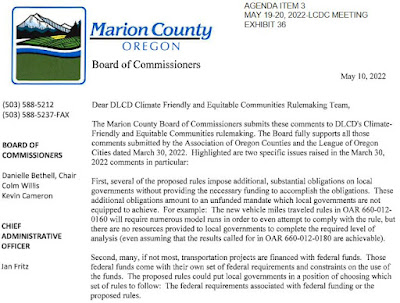Over at our Strong Towns group, they've posted a note about what could be the final adoption of new rules on climate, transportation, and land use.
 |
| We are "dramatically off-track" - DLCD summary |
The focus here is on the City and MPO, and so it was good to be reminded of state-level action.
The Department of Land Conservation and Development has been working on new climate rules for planning in the "Climate-Friendly and Equitable Communities Rulemaking" project.
On Thursday the parent board for DLCD, LCDC, meets and looks to adopt the final version.
Sightline yesterday published an article about the subset of rules on parking, "Oregon Has a Chance to Sharply Cut Urban Parking Mandates."
Parking mandates aren’t the main reason we have parking lots, of course. We have parking lots because cars are useful and, in many cases, necessary. And Oregon isn’t considering a ban on parking lots, new or old.
But the effect of mandatory parking lots is to keep cars necessary. By forcing buildings apart and driving up the cost of adding homes, shops, and offices to walkable areas, parking mandates make it illegal for cities to ever voluntarily evolve away from auto dependence.
Parking mandates ban new Main Streets by requiring each new 2,000-square-foot cafe to be surrounded by 5,000 square feet of parking lot. They keep buildings vacant. They drive up the rent in new apartments by hundreds of dollars a month and kill the incentive of landlords and employers to save everyone money by coordinating shared cars or discounted transit passes. They induce deadly heat islands and, by forcing new buildings to be spread out, literally cast modern auto dependence into stone.
Since Council just adopted some parking reform already, I am not sure how much more these new rules will change things right here. That will become clear soon enough. And even if we successfully anticipated most of these state-level changes (and we may not have done so), that's not a reason to oppose them statewide. They will be helpful regardless of how much additional compliance Salem will need to add.
In their most recent comment, the City of Salem only asked for more time to complete a task they would be assigned, and did not seem to criticize the new rules otherwise.
 |
| City of Salem: More time for Scenario Planning |
Cherriots broadly endorsed the whole.
 |
| Cherriots: Broadly supportive |
Unsurprisingly, Marion County broadly complained.
 |
| Marion County: Slow-walking and road blocks |
Some knowledgeable citizens also wrote to say the rules are still insufficient and should be strengthened in various ways, especially with more focus on actually reducing total driving in Vehicle Miles Traveled.
 |
| DLCD admits "rules do not go far enough" |
In a supplemental Staff Report, DLCD admits this is true and "finds a reasonable basis for this concern."
It looks like the current draft of rules is cued up for adoption as-is, and any changes will be in a subsequent round of rule-making.
LCDC meets Thursday and Friday the 19th and 20th. Full agenda and meeting packet here.


No comments:
Post a Comment